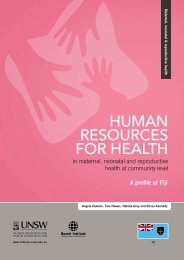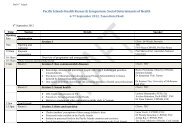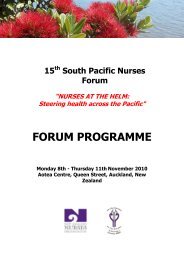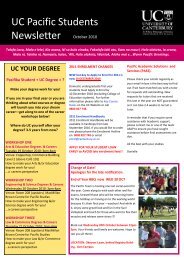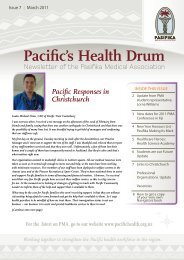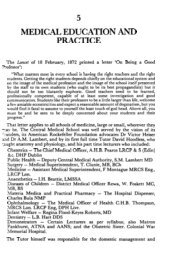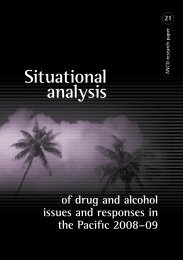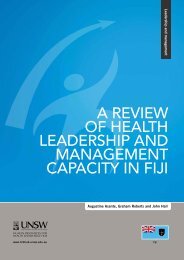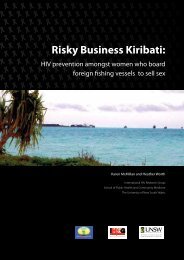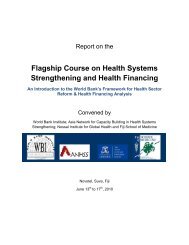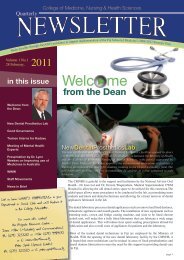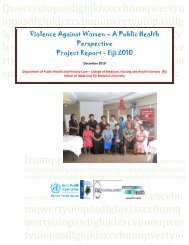rp21 situational analysis - Pacific Health Voices
rp21 situational analysis - Pacific Health Voices
rp21 situational analysis - Pacific Health Voices
Create successful ePaper yourself
Turn your PDF publications into a flip-book with our unique Google optimized e-Paper software.
Situational <strong>analysis</strong> of drug and alcohol issues and responses in the <strong>Pacific</strong><br />
58<br />
is increasingly marginalised within the region,<br />
and the push to reinstate democratic government<br />
takes priority. At the time of writing Fiji<br />
had been suspended from participation in the<br />
<strong>Pacific</strong> Islands Forum, the <strong>Pacific</strong> Islands Chiefs<br />
of Police, and the Commonwealth.<br />
<strong>Health</strong> and development<br />
Fiji, while maintaining a large subsistence<br />
sector, is one of the most developed of the<br />
<strong>Pacific</strong> Island economies. In addition to forest,<br />
mineral and fish resources, sugar exports,<br />
remittances from Fijians working abroad and<br />
a growing tourist industry 261 are the major<br />
sources of foreign exchange. 262 However, Fiji’s<br />
tourism industry has been damaged by the<br />
December 2006 coup and ongoing instability<br />
and the nature and timing of any recovery<br />
are uncertain. Tourist arrivals for 2007 are<br />
estimated to be down almost 6 per cent,<br />
resulting in substantial job losses. In July<br />
2007 the Reserve Bank of Fiji announced the<br />
economy was expected to contract by 3.1 per<br />
cent in 2007. Fiji’s current account deficit<br />
reached 23 per cent of GDP in 2006, 263 and<br />
is reflected in the <strong>Health</strong> and Development<br />
Indicators. 264<br />
4.2 Drug and alcohol<br />
overview<br />
Fiji has participated in all the <strong>Pacific</strong> Drug<br />
and Alcohol Research Network meetings to<br />
date. The 2006 and 2008 meetings were<br />
held in Fiji with the Fiji School of Medicine<br />
(FSMed) as co-host. In addition, the<br />
FSMed is cooperating with the Burnet Institute<br />
to undertake research into the interactions<br />
of HIV, STIs, drugs and alcohol use in<br />
Fiji. The research is applying an adapted and<br />
refined rapid assessment methodology used<br />
for a similar study in Papua New Guinea in<br />
2006–07. 265 The National Substance Abuse<br />
Advisory Council functions as the principal<br />
NGO dealing with drug and alcohol issues in<br />
Fiji; it has a strong focus on education and<br />
awareness raising. The Fiji Council of Social<br />
Services and the Fijian Police also undertake<br />
significant activities aimed at ameliorating<br />
the negative effects of drug and alcohol<br />
consumption.<br />
Over the last decade the key drugs of concern<br />
in Fiji have been repeatedly identified as cannabis,<br />
alcohol, yaquona (kava) and tobacco, 266<br />
a view supported by the key informant for<br />
this research. The FSMed and Burnet Institute<br />
rapid assessment has identified some links<br />
between substance use and violence in Fiji,<br />
noting that the issue is a relevant concern.<br />
261 Fiji Islands Bureau of Statistics — 400 000–500 000 tourists<br />
annually (last accessed November 2009).<br />
262 Ibid.<br />
263 Ibid.<br />
264 Earth Trends, above, fn.255.<br />
265 See section 10 of this report on Papua New Guinea.<br />
266 Dr Noere (2007), Substance abuse in primary health care. Fiji General Practitioner, 15(2): 8–10.



